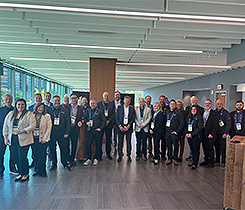New Congress gets back at it
The 108th Congress that convened in January will have to revisit many of the energy issues the 107th Congress never resolved.
Will Congress make another stab at passing a comprehensive energy bill? If so, the groundwork may have been laid with provisions included in the Senate-passed version last year, including tax incentives for clean burning fuels.
“We worked very hard to get that into a vehicle we thought was going to see some action,” says Lisa Bontempo, legislative affairs director for the National Propane Gas Association.
The energy bill ultimately failed and Congress didn’t even boost spending for research or energy assistance ? meaning that as of mid-winter, the Low-Income Home Energy Assistance Program hasn’t gotten any funding increase. But the year shouldn’t be regarded completely negatively, Bontempo says.
“This was one of the most active legislative years for us. We were fortunate to have positioned ourselves well enough throughout the course of the 107th Congress to be able to react swiftly to many of the bills or opportunities that came about in the session,” she says. “Sometimes the success of a legislative session can be gauged as much by what doesn’t pass as what does.”
NPGA, for instance, helped defeat a provision that would have created user fees for hazmat transporters. Bontempo says she doubts the new Congress will try again to pass one.
She does, however, anticipate another attempt to pass a Chemical Security Act designed to protect the nation from a chemical attack, which made it through a Senate committee but not to a vote in either house in the last Congress. That legislation exempted propane from its safety requirements.
“We’re the only industry to get an exemption. We worked very hard to show members of the Senate why including us in the bill doesn’t make sense … and would not increase safety or security,” Bontempo says.
NPGA also hopes to see Congress pass some new tax breaks this year: everything from accelerated depreciation to permanent repeal of the estate tax and increased expensing limits.
The docket this year also may include legislation to strengthen hazmat transportation, which Congress failed to pass last year. Sen. John McCain (R-Az.) resumes the chair of the Committee on Commerce, Science & Transportation
and he has pushed the issue before.
And since Republicans have regained control of the Senate, James Inhofe (R-Okla.) replaces James Jeffords (I-Vt.) as chair of the Environment & Public Works Committee. Inhofe “understands our industry and…understands
the difference between flammable fuel and chemicals,” she observes.
Briefly Speaking
- LP gas prices
Residential propane prices stood 12.5 cents per gallon higher
at the end of 2002 than a year earlier, the Energy Information Administration
reports. Wholesale prices rose from 61.1 cents to 62.3 cents per gallon
over the year. December storms drew stocks down 600,000 barrels to about
52.2 million, still within average inventory range. The nation used about
8.9 million barrels in December, more than 16 percent below the five-year
monthly average of about 10.6 million.
- RSPA standards
The Research & Special Programs administration announced in December
that it plans to conform its Hazardous Materials Regulations to international
standards. RSPA plans to revise descriptions of liquefied compressed gases,
with new categories for high and low pressure liquefied gasses.
- OSHA delay
Three occupational injury reporting requirements won’t take effect
as scheduled this year. The Occupational Safety & Health Administration
postponed implementation of rules that would have required employers to
report work-related musculoskeletal disorders, hearing loss, and privacy
concerns.
















